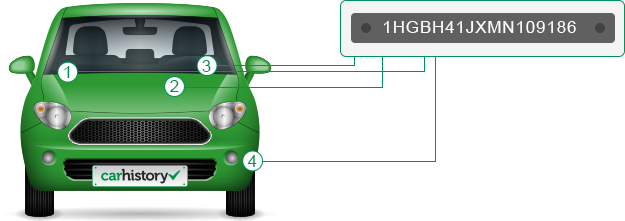
The vehicle identification number (VIN) is composed of 17 characters (digits and capital letters) that act as a unique identifier for the vehicle. A VIN displays the car's unique features, specifications and manufacturer.
The VIN can be found in a couple of places including on the car's registration label (1), on the compliance plate in the engine bay (2) or on the passenger side windshield (3), or on one of the door posts (where the door latches when it is closed) (4). See the image below:
What secrets might your next used car be hiding? Has it been involved in a serious collision that damaged the engine bearings? Was the last owner a smoker who left a terrible smell in the cabin? Is there any outstanding finance on the car that could cost you a fortune?
To find out if the car has a clean financial history, make sure you get a CarHistory report.
When you buy a car, you might also become responsible for any outstanding debts associated with it1. For example, if the car was initially bought on finance and the previous owner stops paying the debt back when you buy it, the financier could repossess the vehicle1. To find out if the car has a clean financial history, make sure you get a CarHistory report.
Do police fines count as outstanding debts against the car?
Speeding tickets are not against the car itself, but the driver, so if you come across a seller who has hundreds of dollars of unpaid speeding tickets against their name, don't worry. That won't carry through to you. You need to ensure that when you buy the car, the change of ownership is officially recorded. Otherwise, you could be driving a car in someone else's name, and potentially picking up more fines.
Queensland Police have recently installed numberplate recognition technology in their speed cameras in their cars, which not only helps to better identify lead-footed drivers, but also locate stolen cars2. The technology successfully scanned 23 million numberplates over the past 16 months2, so it's clearly working!
Any speeding fines won't count against your name, but buying a stolen car can be an offence against the buyer. If you have any reason to suspect the seller hasn't acquired the car they're selling through legitimate means, you should walk away from the purchase.

Parking fines, on the other hand, count against the car, rather than the driver. It's the responsibility of the buyer to check if the car has any outstanding fines (although the seller should disclose that information). If you have lots of parking fines and your car is located parked somewhere in public, it might be clamped or impounded.
For more articles about what you need to check before you buy a used car, or to buy a report, get in touch with CarHistory today. And remember, police operate with serious technology now, so slow down and avoid the risk of a fine completely.
1. Personal Property Security Register. Buying a car? Accessed May 2017.
2. CarAdvice. Automatic number plate recognition in detail: We go on patrol with Queensland police. Accessed May 2017.